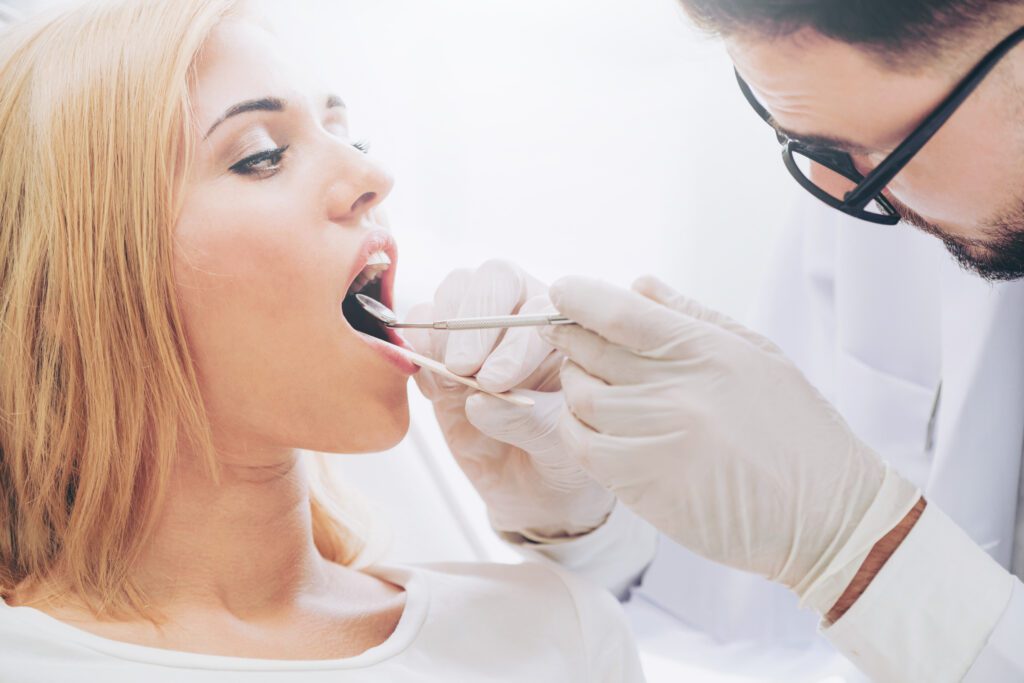We all know someone who is afraid of going to the dentist. Maybe it is your mother, maybe a child, or maybe it’s the man in the mirror. The fact is, dental anxiety is highly common. In a 2009 study, dental phobia outstripped the phobias of heights and spiders as the most common of those fears tested.
Even if we don’t feel outright fear when visiting the dentist, most of us have at least felt a twinge of nervousness when we settle into the chair, but why is that apprehension almost universal? The results of dental work speak for themselves, and most of us clearly understand that regular visits to the dentist are essential to dental health, but that understanding doesn’t negate the anxiety of visiting the dentist.
In this article, we’ll explore some of the reasons behind dental anxiety and how to manage it moving forward. By doing so, we hope to acknowledge the concerns behind visiting the dentist while suggesting healthy solutions so your teeth get the care they deserve.

Reasons for Dental Anxiety
While universal fear of the dentist very likely has cultural roots, the severity and specificity depends on the individual. It ranges from embarrassment of poor dental hygiene or the social awkwardness of a one-sided conversation to the memory of previous pain. There are other reasons even beyond this list:
- Lack of control
- Pain
- Fear of injections
- Fear of tools
- Embarrassment
- Bad experiences in the past
Downsides of Avoiding the Dentist
While visiting the dentist can cause anxiety, the consequences of not doing so are far-reaching and more difficult to correct:
- Cavities
- Plaque and tartar
- Infected teeth
- Gum Disease
- Tooth loss
- Bad breath
- Discolored teeth
Don’t let dental anxiety cause you to procrastinate your dental care. Be proactive in protecting and preserving your teeth. You can do that by managing your dental anxiety.

Ways to Manage Dental Anxiety
The build-up to an upcoming event can be the best or worst part of the experience. Studies have shown that the time preparing for and dreaming about a vacation can be the most enjoyable part of the process, and just like the anticipation of a positive event can add to the thrill, the anticipation of something we are not looking forward to can increase the dread.
Our brains are very powerful, crafting worse-case scenarios and experiencing manifestations of bad outcomes. The truth is that going to the dentist is usually not as bad as one expects it to be. For example, how many times have you heard a root canal used as a stand-in for a painful or bad experience? They have a reputation that precedes them, when in reality root canals are the solution to pain that already exists. Sure, they leave the jaw feeling tender for a while after the procedure, but that is almost always less painful than the problem that caused the need for a root canal.
Go With Someone You Trust
There is no shame in taking someone with you to the dentist to help you feel more in control of the situation. Find someone who will offer support as you make the steps to manage your dental anxiety.
Get There Early
Nothing adds to anxiety like rushing at the last minute. Allow yourself plenty of time to get there and take deep breaths in the lobby.
Control Your Stress Response
While this can be difficult in the heat of an anxiety attack, practicing beforehand will train your body to pause its nervous response. Take deep breaths to calm yourself and control your breathing. If you know you have a dental appointment coming up, do some stretches or meditate beforehand to control your body’s stress response.
In very severe cases, your GP may prescribe some anxiety medication to help you manage anxiety attacks. Working with a psychologist is another, less invasive, option to help work through extreme dental phobia.
Distract Yourself
If you have tricks that distract your stress response from engaging, consider if they are appropriate for the dentist office. Listen to music through headphones or other calming sounds like ocean waves. This is common practice for other anxiety-inducing procedures like MRIs.

Find the Right Dentist for You
Dentists are people too, which means that, like you, they have unique personalities and styles of interacting with patients. It may take a bit of trial and error, but find a dentist whose personality works with what you need to cope with dental anxiety. Comfort at a dental visit is also influenced by the dental office itself, by the building and the other staff. Find an office atmosphere that is calming with a friendly reception team.
To give yourself more control during your dental care, coordinate with your dentist on a signal (like a raised hand) you can give if you feel uncomfortable at any point in the procedure. If you like to understand what is happening during each step of the dental care process, find a dentist that answers your questions, explains procedures and what to expect, and honors requests for breaks.
In your search for the right dentist, you can check out online reviews or try different dental offices based on the recommendations of those you trust. If you are looking for a dentist in North Dakota that puts your needs first and can help you cope with dental anxiety, check out our office at Bismarck Dental Implants. We offer everything from general family dentistry to serious corrective procedures.
